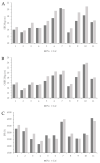The Effects of Caffeine on Jumping Performance and Maximal Strength in Female Collegiate Athletes
- PMID: 34444656
- PMCID: PMC8401934
- DOI: 10.3390/nu13082496
The Effects of Caffeine on Jumping Performance and Maximal Strength in Female Collegiate Athletes
Abstract
Caffeine is often used in a variety of forms to enhance athletic performance; however, research regarding caffeine's effects on strength and power in female athletes is lacking. Therefore, the purpose of this study was to analyze the acute effects of caffeine anhydrous (6 mg/kg of body mass) on jumping performance and maximal strength in female collegiate athletes. Eleven athletes (19.7 ± 0.9 yrs; 166.4 ± 10.2 cm, 67.7 ± 9.4 kg) performed two testing sessions separated by one week, and randomly received caffeine or placebo using a double-blind approach. Heart rate, blood pressure, and tympanic temperature were recorded before athletes received each condition, following 60 min of quiet sitting, and directly after performance testing. Athletes were assessed on unweighted and weighted squat jump height (SJH0, SJH20) and countermovement jump height (CMJH0, CMJH20), isometric mid-thigh pull peak force (IPF), and rate of force development from 0-200 ms (RFD200). Resting systolic blood pressure was significantly greater following caffeine administration compared to a placebo (p = 0.017). There were small, significant differences in SJH0 (p = 0.035, g = 0.35), SJH20 (p = 0.002, g = 0.49), CMJH0 (p = 0.015, g = 0.19), and CMJH20 (p < 0.001, g = 0.37) in favor of caffeine over placebo. However, there was no significant difference in IPF (p = 0.369, g = 0.12) and RFD200 (p = 0.235, g = 0.32) between conditions. Therefore, caffeine appears to enhance jumping performance, but not maximal strength in female collegiate athletes.
Keywords: anaerobic exercise; ergogenic substances; force production; methylxanthine; neuromuscular performance; resistance training.
Conflict of interest statement
The authors declare no conflict of interest.
Figures


References
Publication types
MeSH terms
Substances
Grants and funding
LinkOut - more resources
Full Text Sources
Medical

